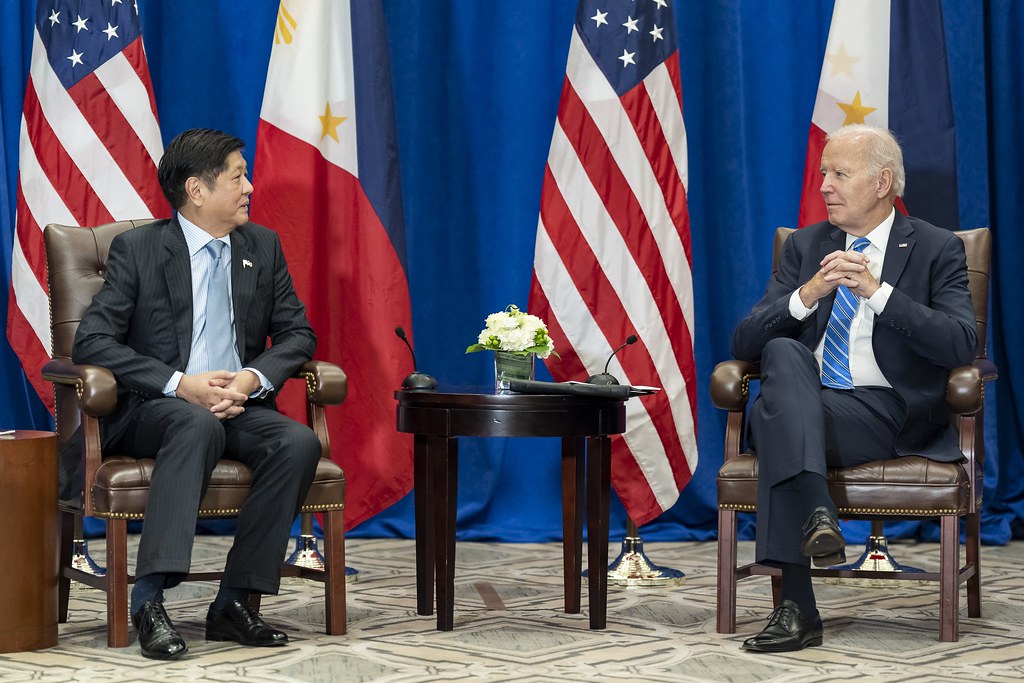Philippines: Speak Up for Human Rights
President Joe Biden offers a warm welcome to the president of the Philippines, despite vast human rights violations throughout the country, and gets more military access in return.
President Joe Biden offers a warm welcome to the president of the Philippines, despite vast human rights violations throughout the country, and gets more military access in return.
The following article was published in the May-June 2023 issue of NewsNotes.
President Ferdinand “Bongbong” Marcos Jr. was scheduled to visit the White House on May 1. The International Coalition for Human Rights in the Philippines (ICHRP-US) planned an all-day vigil across the street from the White House, “to be vigilant in our solidarity with human rights defenders in the Philippines and to speak out against the United States enabling human rights violations and war crimes in the Philippines.”
Susan Gunn, Director of the Maryknoll Office for Global Concerns, shared stories of human rights violations she heard while touring the Philippines with a faith delegation in March – stories of red-tagging and other forms of intimidation, in addition to extrajudicial killings and unlawful detentions and arrests by the military and police, targeting church leaders, indigenous peoples, peasant farmers, Christian and Muslim community members, lawyers and journalists. Watch a recording of the report at https://mogc.info/Ph-webinar
“The Philippines has a long and intense history of human rights abuses spanning years of colonization, martial law, and ongoing and protracted armed conflicts,” Gunn said. “After the People Power Revolution toppled the rule of Marcos Senior in 1986, martial law ended and a new Constitution was adopted, including a Bill of Rights.”
Yet, according to a 2020 UN report, “effective implementation [of basic human rights protections] remains elusive.” The report places the blame for this on two entrenched groups in the Philippines: landowning elites and political dynasties. Together and independently, they wield political and economic influence at national and local levels.
The southernmost island of Mindanao is an especially hot spot for ongoing armed conflicts between the Philippines military, with the active support of U.S. troops, and Muslim and Communist armed groups. “U.S. troops in Mindanao gave guidance to the Philippines military in 2017 when Islamic insurgents took hostages in the city of Marawi, the largest Muslim-majority city on the island. It comes as no surprise that the Philippine government took a scorched earth mentality in the conflict in Marawi, bombing out the city and displacing tens of thousands. It is a mentality rewarded by the U.S. military and its war on terror.”
Now President Biden and the current Philippines president, Marcos Junior, have agreed the U.S. military will send more troops and equipment to Mindanao, as well as to four new locations in the northern part of the country, to face Taiwan. In exchange, the president of the Philippines received a handshake from Pres. Biden at the UN a few months ago, and now a visit to the White House.
At the onset of his presidency, Joe Biden stated that he was “putting human rights at the center of U.S. foreign policy.” This is yet to be seen in the Philippines. In its place, intimidation and persecution harms all members of society working to uphold basic rights and the rule of law, while the military and police spread a culture of fear, exclusion and violence.
Now, more than ever, it is urgent that the United States refuse to fund institutions responsible for human rights abuses in the Philippines.
Faith in action
Send a message to your representative in Congress to support the Philippines Human Rights Act. https://mogc.info/PhilippinesHumanRights
Photo of President Biden hosts a meeting with President Marcos Jr, September 21, 2022 by Adam Shultz, from the White House

